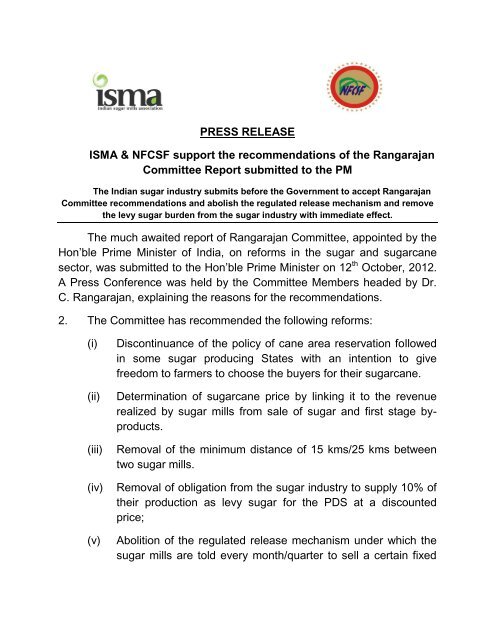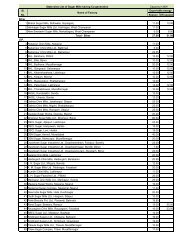Press Release - 8 Nov. 2012.pdf - Indian Sugar Mills Association
Press Release - 8 Nov. 2012.pdf - Indian Sugar Mills Association
Press Release - 8 Nov. 2012.pdf - Indian Sugar Mills Association
You also want an ePaper? Increase the reach of your titles
YUMPU automatically turns print PDFs into web optimized ePapers that Google loves.
quantity of sugar. Non-compliance of the same invites penalaction or conversion of unsold quantity into levy sugar.(vi)A freer international trade policy wherein quantitative controlsand time restrictions on export and import of sugar should notbe prescribed by the Government. Instead, the Governmentshould follow a tariff rate policy to manage the import/export ofsugar as per the requirement in the country.(vii) Exempt sugar from the compulsory packing order under theJute Packaging and Marking Act, 1987, which will give freedomto the sugar mills to decide on the packaging material to beused, as per availability, quality and pricing.(viii) A market determined pricing policy for the sale of by-productslike molasses, bagasse and press mud, giving full freedom tothe mills to sell these products and any value added productsthereof.3. Rangarajan Committee has very clearly recommended for immediatederegulation of two important controls involving abolition of regulatedmechanism and open market sugar purchases by the Government for thePDS. These two controls are seen to be archaic and have outlived theirutility in today’s world. No other industry in India or any sugar industry inany of the countries in the world, are subjected to these two controls.4. Rangarajan Committee has accepted that the levy sugar burden isbeing cross subsidized by the open market consumers who consume 90%of the sugar and also that the losses suffered by the sugar mills are partlytransferred to the farmers. Therefore, there is a very strong case thatsimilar to the other commodities, where the Government procures the samefrom the open market, sugar also should be procured by the Governmentfrom the open market, such that financial burden of this social welfareprogramme of the Government, is borne by the Government, and not bythe sugar mills or the farmers or the open market consumers.5. The regulated release mechanism adversely impacts smooth cashflows of sugar mills, who are unable to sell their sugar as per their cash2
flow requirements to pay to the farmers, especially during the crushingseason, leading to either cane price arrears of farmers or borrowing ofworking capital at 14-16%, increasing their costs of production and makingthem uncompetitive especially in the international market. RangarajanCommittee as well as the Government Ministries have, at various times,accepted that the regulated release mechanism is unable to meet itsobjective of controlling sugar prices. <strong>Sugar</strong> is the only commoditysubjected to this kind of controls. If the Government is able to controlprices of other commodities without having a regulated release mechanism,why should they have a special and unfortunate treatment for sugar?6. Therefore, as recommended by the Rangarajan Committee, ISMAand NFCSF together appeal to the Government to remove the levysugar burden from the sugar industry and abolish the regulatedrelease mechanism with immediate effect.7. Rangarajan Committee has also recommended for removal of sugarfrom the JPMA, and give freedom to the industry to choose their packingmaterial. Rangarajan Committee has accepted that compulsory use of jutebags for sugar leads to increased cost of Rs. 40 per quintal of sugar, whichtranslates into an annual loss of Rs. 1000 crore to the industry. Part of thisis usually not only passed on to the farmers in the form of lower cane price,but also to the consumers by way of higher sugar price. The Governmentis also itself not able to find jute bags for packaging its own foodgrains andhave decided to allow 10% of foodgrains to be packed in non-jute bags. Itis accepted that jute bags are good for foodgrains but seriously harmssugar since it allows moisture regain in such a highly hygroscopiccommodity like sugar.8. The Government has already taken steps for open export-importpolicy of sugar, which we welcome. Steps to encourage utilization of byproductsfor production of renewable power and ethanol as bio-fuel forblending with petrol, in tune with the recommendations of the RangarajanCommittee, would also be highly welcome.9. Recognizing that the controls on sugarcane, mentioned at Sl. Nos. (i),(ii) and (iii), will affect about 50 million farmers and their families, mostly3
small and marginal having 1-2 hectares of farm land, and that these powersare mostly exercised today by the State Governments, RangarajanCommittee has recommended that detailed deliberations need to be heldwith the States and the farmers need to be convinced on the advantages ofthe same. It has, therefore, recommended deregulation of these controlsover a period of 2-3 years.ISMA and NFCSF agree that the reforms on the sugarcane sideneed further discussions amongst the State Governments, farmersand the sugar mills to incorporate views of all the stake holders in thenew policy framework.10. Concluding, the sugar industry welcomes the Rangarajan Committeerecommendations which would help achieve an annual growthrate of 15-20%, taking the Rs. 80,000 crore industry to Rs. 1,60,000 crore in the nextfive years. With a more predictable and stable policy environment, largescale investments are expected to be attracted, which would improveefficiencies both at the factory and farm levels. Research for better seedvarieties would give better returns to the mills, better sugar quality toconsumers at a stable price and increased productivity to the farmersgiving them better returns from the same piece of farm land.Therefore, the <strong>Indian</strong> sugar industry, very humbly but emphatically,would like to submit before the Government to accept RangarajanCommittee recommendations and abolish the regulated releasemechanism and remove the levy sugar burden from the sugarindustry with immediate effect.For further information, please contact:Abinash VermaDirector GeneralISMAVinay KumarManaging DirectorNFCSF Ltd.4
















